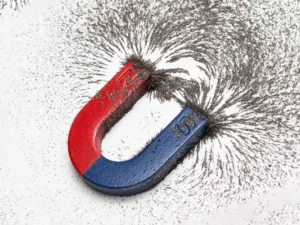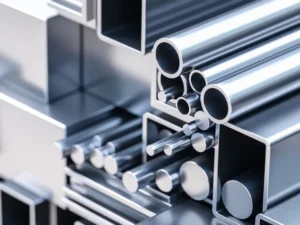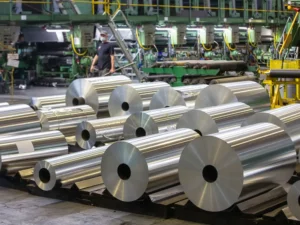Aluminum, a metal we use daily, has a magnetic mystery. It is not your typical magnet-friendly material. So it does not stick to the fridge. Yet, aluminum will have shallow attraction near a strong magnetic field. This raises a question: Is aluminum magnetic or not?
Non-sticking of aluminum to the fridge indicates non-magnetic property. But it has unpaired electrons. Is it not contradictory? Most metals that have unpaired electrons are magnetic. To debunk this confusion, I am writing this detailed article. So, let’s go down and discuss the magnetism of aluminum.
Overview of Magnetism

Magnetism refers to attraction or repulsion induced by electric charges. The presence of unpaired electrons in a material indicates its magnetic behavior. Material with paired electrons will have non-magnetic properties, and vice versa.
Let me make it even simpler. A material’s magnetic behavior is due to its electrons’ spin and orbital motion. Remember that each material consists of orbitals filled with electrons. For example, a material with unpaired electrons in the orbital would be magnetic.
The reason is that the spin of electrons won’t cancel each other. So, the material will be magnetized. But if an orbital is filled, two electrons will have opposite spin. So, these opposite spins will cancel each other out. So, the material will be non-magnetic. There are different types of magnetism. Here is their list:
- Paramagnetism
- Diamagnetism
- Ferromagnetism
The materials exhibiting these magnetic behaviors are paramagnet, diamagnet, and ferromagnetic. These materials are different in terms of their electron presence in the orbitals. I have another article where I explain the magnetism of brass. You check it out to understand these types.
Types of Magnetic Materials
As I mentioned earlier, magnetism varies in its types. Some materials exhibit strong magnetism, while others are inclined towards weaker. Let’s have a bird view on these types:
- Paramagnetism: These materials aren’t super-attracted to magnets. Examples include aluminum, tin, and magnesium. They get magnetized only when near a super-strong magnetic field.
- Diamagnetism: These materials get pushed away by magnets. Their examples are Zinc, mercury, lead, sulfur, copper, silver, and bismuth. When put in a powerful magnetic field, they become slightly (negligible) magnetic.
- Ferromagnetism: Materials such as iron, nickel, etc., follow ferromagnetism. They are attracted to the magnet. These materials have super high permeability, sometimes ranging into the thousands. The magnetic effects of electrons don’t cancel out. They create a strong internal magnetic field.
Is Aluminum Magnetic?

No, aluminum in its pure aluminum is not magnetic. It follows paramagnetism. It cannot generate its magnetic field. Magnets cannot attract aluminum in normal conditions, and it does stick to it. Yet, certain aluminum alloys can become magnetic.
Remember that the magnetic behavior of aluminum depends on many other factors. Those include the composition, impurities, and alloy elements. Aluminum with some impurities in it can exhibit magnetism. The reason is that this impurity changes its composition. The same goes for the alloy elements added with aluminum.
Suppose aluminum is present with any other magnetic alloy element. Due to this alloying element, aluminum will also become magnetic. Aluminum is paramagnetic, which indicates very little magnetism. The very small magnetism of aluminum results from three unpaired electrons in its outermost shell.
You might have heard that aluminum exhibits magnetism. Yes, that is true, too, but under specific conditions. For example, strong magnets temporarily magnetize aluminum in the magnetic field. But it quickly loses this magnetization outside that applied strong field.
Why Is Aluminum Not Magnetic?
Aluminum isn’t magnetic due to the unpaired electrons in its atoms. These electrons produce a weaker magnetic attraction. So, this material falls into the paramagnetic category. Electrons in such material don’t cancel out their spinning. So, they exhibit non-magnetic or weaker magnetic behavior.
The more unpaired electrons, the stronger the attraction to magnets. However, aluminum has only one unpaired electron, resulting in a weak magnetic pull. Yet, this weak magnetism fades when the magnetic field is gone.
Scientists measure magnetic property with “magnetic susceptibility.” Aluminum has a low value of 2.2B.M. It is a positive magnetic susceptibility. This means that aluminum has some response to a magnetic field. Yet, 2.2 is still relatively low for magnetism. This is why aluminum is paramagnetic and doesn’t stick to magnets.
Does Aluminum Stick to Magnet?

No, aluminum does not stick to the magnet, nor does the magnet stick to it. This question is pervasive. Magnets stick to materials that exhibit magnetic behavior and follow ferromagnetism. However, aluminum does not exhibit such characteristics and follows paramagnetism.
Although aluminum has unpaired electrons, it is not capable of producing magnetism. Even under certain conditions, the magnetism induced in aluminum is short-lived. However, some aluminum with its alloy might stick to the magnet. This is rare; if this happens, the alloy element would be the culprit.
Is it possible to make aluminum magnetic?
Yes, it is possible to induce magnetic properties in aluminum material. There are two ways to do it. Let’s discuss them.
- Get a strong magnet and tie it on a thread. Now, place it near an aluminum material. The magnet’s magnetic properties will be induced in the aluminum material.
- Another method is to pass an electric current through the material. During this time, both electric and magnetic fields are also produced. Now, if you bring a ferromagnetic metal close to it, the two will attract each other. But this magnetic field is also temporary.
Aluminum products are available in different shapes. The standard products include aluminum sheets, Aluminum plates, aluminum rods, and Aluminum coils. All of them find their uses in industries. However, they all are non-magnetics. But you can magnetize all of them using the methods mentioned above.
Conclusion
In summary, aluminum is not magnetic on its own. However, near strong magnets, it gets a bit magnetic. Aluminum alloys can be magnetic. Aluminum’s not being magnetic makes it perfect for industries. If you plan to buy the best aluminum for personal or industrial uses, visit HXSCO. Our team will understand your needs and give you high-quality aluminum.
